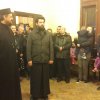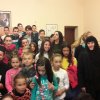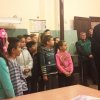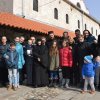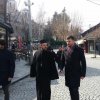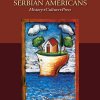Сва деца из српског села Кузмин, код Косова Поља, добила су новчану помоћ коју је сакупило Коло српских сестара из Сан Франциска.
Поклон за осамдесеторо деце уручио је епископ западно-амерички Максим који је посетио Основну школу "Аца Маровић" и ово изоловано место у албанском окружењу.
"Драга децо, драги учитељи, желим да вам пренесем поздраве ваших вршњака из Сан Франциска и Америке. Они вам поручују, да тамо, у далеком свету, неко мисли на вас и жели да вам помогне у вашем селу, у вашем месту", рекао је владика Максим који је разговарио са децом.
Основна школа у Кузмину ради у тешким и неодговарајућим условима, а настава се одвија од првог до четвртог разреда. Њени ђаци су владики поклонили своје цртеже уместо разгледница за своје вршњаке у Америци.
"Заиста смо почаствовани овом посетом, био је ово прави празник за децу. Нама ретко ко долази, некако смо овде одвојени од света, али има добрих људи и хвала им свима", рекла је учитељица Сузана Андрић.
Коло српских сестара из Сан Франциска и Епархија западно-америчка годинама помажу српској деци у селима Косова и Метохије. У Кузмину живи око сто српских породица, приметан је тренд исељавања, али се земља и куће не продају Албанцима.
Извор: РТС

